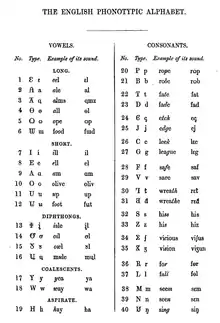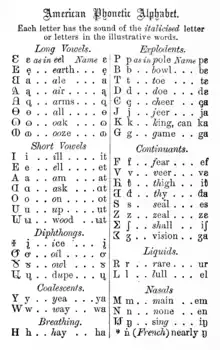English Phonotypic Alphabet
The English Phonotypic Alphabet is a phonetic alphabet developed by Sir Isaac Pitman and Alexander John Ellis originally as an English language spelling reform.[1] Although never gaining wide acceptance, elements of it were incorporated into the modern International Phonetic Alphabet.[2]



.png.webp)
It was originally published in June 1845.[3] Subsequently, adaptations were published which extended the alphabet to the German, Arabic, Spanish, Tuscan, French, Welsh, Italian, Dutch, Polish, Portuguese and Sanskrit languages.[4]
Letters
The letters are as follows (with some approximations to accommodate Unicode)
Late 1843 (English)
At this stage, long vowels had a cross-bar, and short vowels did not
- Long vowels
Ɨ /iː/, E /eɪ/, A /ɑː/, Ɵ /ɔː/, Ʉ /oʊ/?, ꭐ-bar /uː/
- Short vowels
I /ɪ/, ⵎ /ɛ/, Ʌ /æ/, O /ɒ/, U /ʌ/, ꭐ /ʊ/
(a proper ⟨ꭐ⟩ was taller and without the dot, like ⟨Ɯ⟩ but with the middle stem not so tall as the others, and did not have a serif at the bottom right)
- Diphthongs
Ɯ /juː/, ⅄ /aɪ/, Ȣ /aʊ/?
- Reduced ('obscure') vowels
Ǝ /ə/, ⵎ /ᵊ/
- Consonants
P B, T D, Є J /tʃ dʒ/, K G
F V, Θ Δ /θ ð/, S Z, Σ Σ /ʃ ʒ/,
L R, M N, И /ŋ/, Y W H.
- _a /eɪ/
- (Ā)ᶐ /ɑː/
- Ɵɵ /ɔː/
- _ɷ /oʊ/
- Ɯɯ /uː/
- Ii /ɪ/
- Ee /ɛ/
- Aɑ /æ/
- Oo /ɒ/
- Uu /ʌ/
- _(ꭐ)
- _ᶙ /juː/
- Yy /j/
- Ww /w/
- Hh /h/
- Pp /p/
- Bb /b/
- Tt /t/
- Dd /d/
- Єꞔ /tʃ/
- Jj /dʒ/
- Cc /k/
- Gg /ɡ/
- Ff /f/
- Vv /v/
- Ꞁ(ⱦ) /θ/
- Ƌ(đ) /ð/
- Ss /s/
- Zz /z/
- Σʃ /ʃ/
- (Ʒ)ʒ /ʒ/
- Rr /r/
- Ll /l/
- Mm /m/
- Nn /n/
- (Ŋ)ŋ /ŋ/
References
- Daniels, Peter T. (1996). The World's Writing Systems. Oxford University Press. p. 831. ISBN 0-19-507993-0.
- Coulmas, Florian (12 March 1999). "English Phonotypic Alphabet". The Blackwell Encyclopedia of Writing Systems. Wiley. ISBN 0-631-21481-X.
- "Completion of the Phonotypic Alphabet". The Phonotypic Journal. Bath: Phonographic Institution. 4 (42): 105–106. June 1845.
- "Extension of the Phonotypic Alphabet". The Phonotypic Journal. Bath: Phonographic Institution. 4 (43): 121–123. June 1845.